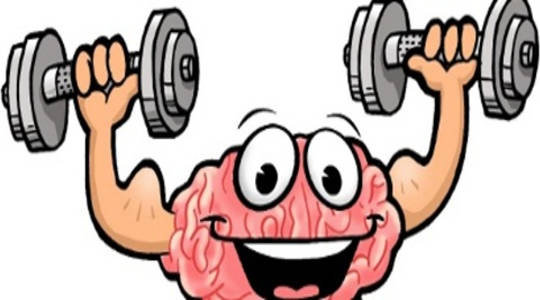
These five practices nurture both the physical brain and the mind itself. They’re not cure-alls or assurances of immortality. We are mortal, and a certain amount of deterioration is inevitable with age. Even so, the following Practices will improve your mental processes, while the lack of them contributes to mental deterioration. Why not give them a try? As the old slogan goes, “A mind is a terrible thing to waste.”
#1 – Health: Feeding the Brain
A good diet and aerobic exercise encourage the brain’s physical well-being, and also focus the mind’s consciousness toward a disciplined goal. A strong flow of oxygenated blood keeps the brain running smoothly, while impeded blood flow can damage or even kill essential parts of that organ, resulting in permanent brain damage.
“A healthy mind in a healthy body,” as the saying goes, is important… especially if you want to stay energized well into your later years. Yet the physical condition of all your vital organs, brain included, remains essential when you want to maintain optimal health.
#2 – TV: The High-Tech Drug
This might seem like blasphemy to many children of the television age, but TV is bad for you. This goes beyond the content of the shows themselves (though heaven knows they can be pretty bad!) to the effects of the medium on the body and brain.
Research since the late 1960s has shown that the lighted, flickering cycle of the television screen reduces Beta wave activity in the brain while boosting Alpha wave activity, creating a low-level and highly suggestible trance state. Neural activity shifts from the brain’s left-side hemisphere (often considered the seat of logical analysis) to the right (the region of intuitive, synthesizing understanding). In the process, the brain’s neo-cortex shifts into a passive mode while the limbic system pumps out fight-or-flight hormones. This, in turn, causes surges in natural opiates – betaendorphins and enkephalins – whose effects resemble street drugs like cocaine and heroin.
In short, the logical mind shuts down as the body produces intoxicating and habit-forming chemicals. “The television set,” writes Wes Moore, “acts as a high-tech drug delivery system.” Clearly, then, a TV habit is not in our best interests!
To improve your mental health (and your physical health as well), limit your TV viewing to perhaps an hour a day if not less. If you have children, I suggest a limit of no more than two hours per day for them… and preferably far less. Young brains are still growing, and the neural pathways upon which we depend throughout our lives are set most effectively during childhood. By parking your child in front of a television set for hours on end, you literally reprogram her body and brain toward unhealthy patterns… perhaps even toward cognitive disorders. Just as you would cut down on sugar and eliminate smoking to improve your physical health, cut down on TV viewing to nurture an equally healthy mind.
#3 – Exercise: Games for Your Mind
Minds thrive on healthy stimulation. While television lowers brain activity (especially in the “logical” regions), certain activities promote it:
- Games – particularly games that use strategy (like chess), wordplay (Scrabble), math (Yahtzee), vocabulary (crossword puzzles), knowledge (Trivial Pursuit), hand-eye coordination (baseball), or any combination of those skills – are fantastic ways to boost mental acuity. This is especially true for children, who need plenty of healthy stimulation but often suffer from counterproductive or outright harmful diversions instead.
- Reading and writing exercise two of humanity’s greatest mental accomplishments: language and imagination. Fiction invites you to enjoy experiences that don’t actually exist, while non-fiction informs you about things you might not already understand. Both venues employ your brain’s ability to decode abstract symbols, connect them to your own experiences, and communicate ideas through thought alone.
Writing, meanwhile, nurtures all of these abilities while inviting you to put those thoughts into words yourself. Reading and writing both nurture mental development, broaden your horizons, and possibly inspire your soul in the process. - Martial arts, dance, and active meditative practices (yoga, t’ai chi, etc.) exercise your mind, body and often spirit at once. These combinations of mental, physical and spiritual activity are extremely rewarding… especially for children, who need all the focus and activity they can get!
- Music provides an excellent focus for mental exercise, especially if you’re learning to play it yourself. Musical scales engage the same neural activities as mathematics does, while the intricate patterns involved in instruments like the piano, guitar and so forth encourage brain development and physical dexterity. Even if you can’t play anything yourself, merely listening to the complex interplay of instruments in a Beethoven symphony or John Coltrane improvisation can excite your heart, elevate your spirit, and revitalize your mind.
#4 – Interesting Lives: Food for Thought
 Witty banter, informed debate, engaging conversations and so forth stimulate neural activity in the brain. By spending time among people who use their heads, you learn things you might not have known before and hone the mental acuity that helps you keep up with them. Socializing with people with sharp intellects (who don’t, I should add, always have college degrees!) challenges our minds.
Witty banter, informed debate, engaging conversations and so forth stimulate neural activity in the brain. By spending time among people who use their heads, you learn things you might not have known before and hone the mental acuity that helps you keep up with them. Socializing with people with sharp intellects (who don’t, I should add, always have college degrees!) challenges our minds.
On a similar note, become an interesting person yourself. Travel. Play a sport. Pursue an intriguing skill like horseback riding, juggling, photography, magic tricks, metalwork, or whatever else seems interesting to you.
Take the initiative to become one of those “interesting people” in someone else’s eyes. The mental focus, heightened attention and boosted self-esteem you’ll receive all pay marvelous dividends!
#5 – Quiet: Put Your Mind at Ease
Stress disrupts your physical and mental health. Even the best kinds of stimulation can grow overwhelming, eventually canceling out their potential benefits. Therefore, take some time for yourself each day to relax and reflect. A daily bit of peace and quiet will go a long way toward helping you achieve and maintain optimal mental health.
© 2013 Lester R. Sauvage, MD. All rights reserved.
Reprinted with permission of the publisher, Better Life Press.
Article Source
Open Your Heart to the Magic of Love
by Lester R. Sauvage.
 Advice from a world-famous cardio surgeon who knows that the secret to a healthy, happy life can be found in a simple program of physical, mental and spiritual fitness. Filled with loving and practical advice, Open Your Heart to the Magic of Love offers guidance for physical, mental and spiritual health from a man who has lived the life he speaks of, and who wants to share its secrets with us all.
Advice from a world-famous cardio surgeon who knows that the secret to a healthy, happy life can be found in a simple program of physical, mental and spiritual fitness. Filled with loving and practical advice, Open Your Heart to the Magic of Love offers guidance for physical, mental and spiritual health from a man who has lived the life he speaks of, and who wants to share its secrets with us all.
Click here for more info and/or to order this book on Amazon.
About the Author
 Dr. Lester R. Sauvage, MD, is a world-famous heart surgeon, author and humanitarian. Dr. Sauvage's career has spanned Boston Children's Hospital, a private surgical practice, a research facility for Providence Medical Center, Seattle Children's Hospital, and other medical institutions. A founding member of Seattle's Hope Heart Institute, he innovated or collaborated upon dozens of surgical techniques and technologies. He was renowned for his amazing work ethic, compassionate manner, and dedication to the healing arts. Retiring from surgery in 1991, he has since authored four books: The Open Heart: Secret to Happiness (1996), You Can Beat Heart Disease (2000), The Better Life Diet (2001), and now Open Your Heart to the Magic of Love: A Healer's Testament to Health, Happiness and Compassion.
Dr. Lester R. Sauvage, MD, is a world-famous heart surgeon, author and humanitarian. Dr. Sauvage's career has spanned Boston Children's Hospital, a private surgical practice, a research facility for Providence Medical Center, Seattle Children's Hospital, and other medical institutions. A founding member of Seattle's Hope Heart Institute, he innovated or collaborated upon dozens of surgical techniques and technologies. He was renowned for his amazing work ethic, compassionate manner, and dedication to the healing arts. Retiring from surgery in 1991, he has since authored four books: The Open Heart: Secret to Happiness (1996), You Can Beat Heart Disease (2000), The Better Life Diet (2001), and now Open Your Heart to the Magic of Love: A Healer's Testament to Health, Happiness and Compassion.

























